Get free scan and check if your device is infected.
Remove it nowTo use full-featured product, you have to purchase a license for Combo Cleaner. Seven days free trial available. Combo Cleaner is owned and operated by RCS LT, the parent company of PCRisk.com.
What is wordorion[.]com?
Sharing many corresponding traits with rumiceseeds.com, courselfan.pro, mediafresh.online and others - wordorion[.]com is a rogue site. It is designed to redirect visitors to compromised/dangerous sites and to push users into consumption of unreliable or even potentially malicious content.
Intentional access to this website is extremely rare, as most of its visitors enter it through redirects caused by intrusive advertisements, or by having it opened by PUAs (potentially unwanted applications) present in their device. It is worth noting that PUAs do not require explicit user permission to infiltrate their systems.
These applications operate by causing unauthorized redirects, delivering invasive advertisements and tracking user data.
![wordorion[.]com pop-up redirects](/images/stories/screenshots201905/wordorioncom-homepage.jpg)
Wordorion[.]com, like many other rogue sites, is spread by unwanted redirects caused by intrusive advertisements. Another way said website is furthered is by PUAs opening new browser tabs/windows and redirecting users to it. The site begins its activity by learning visitors' IP (Internet Protocol) address and through it - inferring their geolocation.
User geolocation is key to determining wordorion[.]com further course of action. Based on this information it either presents users with highly questionable, possibly malicious content and/or redirects them elsewhere. This rogue site also uses web browser notifications, which when allowed - deliver aggressive, invasive ad campaigns (pop-ups, banners, coupons and etc.).
The same risks that wordorion[.]com poses, extend to the adverts it brings. They can cause unchecked redirects to unreliable and harmful websites, as well as execute scripts designed to nonconsensually download/install PUAs. By employing various tools, unwanted applications enable third party graphical content, therefore allowing invasive ad campaigns to occur.
In addition to the threats listed prior, intrusive adverts can also ruin the browsing experience; limit browsing speed and visibility (by covering original site content). PUAs also track data, i.e. monitor and gather intel on users' browsing activity (IP address, browsing and search engine history, personal details and other data).
The information obtained is then sold to third parties, potentially even cyber criminals. It is vital to understand that these applications are a huge safety hazard; they can be the cause of various system infections, privacy breaches and even lead to identity theft. Upon detection, any suspect applications should be removed immediately.
| Name | wordorion.com pop-up |
| Threat Type | Push notifications ads, Unwanted ads, Pop-up ads |
| Serving IP Address | 104.27.184.219 |
| Observed Domains | 1.wordorion[.]com, 40.wordorion[.]com, 41.wordorion[.]com, 50.wordorion[.]com, 53.wordorion[.]com, 6.wordorion[.]com, 63.wordorion[.]com, 65.wordorion[.]com, 8.wordorion[.]com, 94.wordorion[.]com |
| Symptoms | Seeing advertisements not originating from the sites you are browsing. Intrusive pop-up ads. Decreased Internet browsing speed. |
| Distribution Methods | Deceptive pop-up ads, potentially unwanted applications (adware) |
| Damage | Decreased computer performance, browser tracking - privacy issues, possible additional malware infections. |
| Malware Removal (Windows) |
To eliminate possible malware infections, scan your computer with legitimate antivirus software. Our security researchers recommend using Combo Cleaner. Download Combo CleanerTo use full-featured product, you have to purchase a license for Combo Cleaner. 7 days free trial available. Combo Cleaner is owned and operated by RCS LT, the parent company of PCRisk.com. |
There are thousands of PUAs out there, and aside from not requiring express permission to be installed, they also employ clever tactics to slip in undetected. They can spread by rogue installs executed by (often ordinary looking) intrusive adverts. However they also infiltrate systems by being installed along with regular software, as part of install packs/bundles.
It must be stressed that the only goal of PUAs is to make profit for their developers, and aside from that - they serve no purpose for users, whose systems they invade. Unwanted applications cause redirects to compromised and even dangerous sites, deliver invasive advertisement campaigns, gather intel on browsing activity (and by extension garner personal information).
How did adware install on my computer?
Commonly, PUAs end up installed onto computers via intrusive adverts or installation packs/bundles. "Bundling" is a term used to describe a deceptive marketing method used by PUA designers to spread their malicious product. Bundled together with regular software, unwanted applications are frequently unknowingly allowed onto systems by users themselves.
Buried within terms, options and "Custom/Advanced" settings - they pass undetected by hasty users. Another common tactic is disguising these apps under false pretenses of legitimacy and functionality.
In summary, careless approach to ads and a rushed installation process can lead to PUA presence in one's device, along with all the risk they themselves carry. These threats include: a wide variety of system infections, endangerment of user privacy and even identity.
How to avoid installation of potentially unwanted applications?
In general, a careful approach to both browsing and program downloading/installing is a necessary safety measure to ensure device, privacy and identity protection. All downloads should be done via official and verified sources, with direct downloads highly recommended.
Using third party downloaders is not advised, as the desired software is more likely to be bundled with PUAs. Taking note of terms, possible options and using "Custom/Advanced" settings, opting-out from installing additional applications and refusing downloading such from elsewhere - is strongly advised.
Avoiding untrustworthy sites and exercising caution with advertisements - can ensure user safety. It should be pointed out that intrusive ads can appear quite harmless (and therefore difficult to differentiate from the truly innocuous kind), however the websites they redirect to (for example, gambling, pornography, adult-dating and etc.) - are by far easier to determine as suspicious.
Should users encounter such ads/redirects, immediate inspection of their devices for dubious applications and browser extensions/plug-ins should occur, if found - followed up by swift removal. If your computer is already infected with rogue applications, we recommend running a scan with Combo Cleaner Antivirus for Windows to automatically eliminate them.
Appearance of wordorion[.]com website (GIF):
![wordorion[.]com website appearance (GIF)](/images/stories/screenshots201905/wordorioncom-appearance.gif)
Instant automatic malware removal:
Manual threat removal might be a lengthy and complicated process that requires advanced IT skills. Combo Cleaner is a professional automatic malware removal tool that is recommended to get rid of malware. Download it by clicking the button below:
DOWNLOAD Combo CleanerBy downloading any software listed on this website you agree to our Privacy Policy and Terms of Use. To use full-featured product, you have to purchase a license for Combo Cleaner. 7 days free trial available. Combo Cleaner is owned and operated by RCS LT, the parent company of PCRisk.com.
Quick menu:
- What is wordorion.com pop-up?
- STEP 1. Remove spam notifications from Google Chrome
- STEP 2. Remove spam notifications from Google Chrome (Android)
- STEP 3. Remove spam notifications from Mozilla Firefox
- STEP 4. Remove spam notifications from Microsoft Edge
- STEP 5. Remove spam notifications from Safari (macOS)
Disable unwanted browser notifications:
Video showing how to disable web browser notifications:
 Remove spam notifications from Google Chrome:
Remove spam notifications from Google Chrome:
Click the Menu button (three dots) on the right upper corner of the screen and select "Settings". In the opened window select "Privacy and security", then click on "Site Settings" and choose "Notifications".
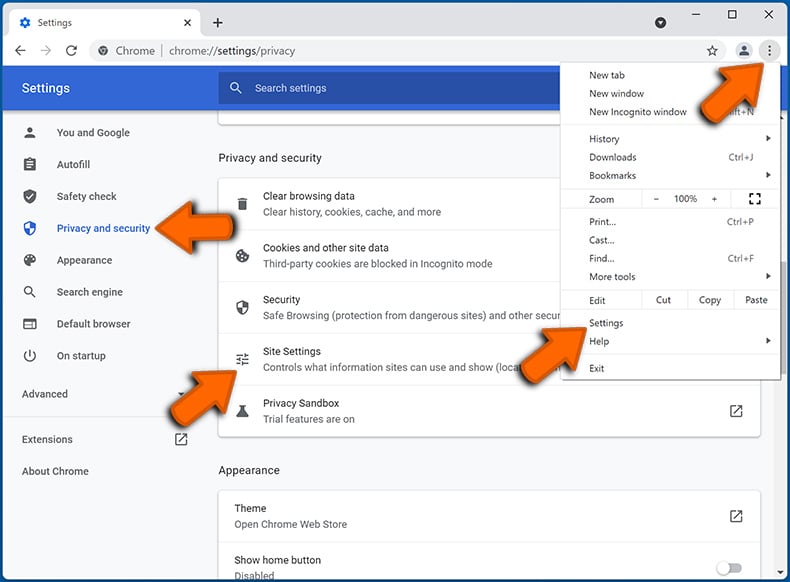
In the "Allowed to send notifications" list search for websites that you want to stop receiving notifications from. Click on the three dots icon near the website URL and click "Block" or "Remove" (if you click "Remove" and visit the malicious site once more, it will ask to enable notifications again).
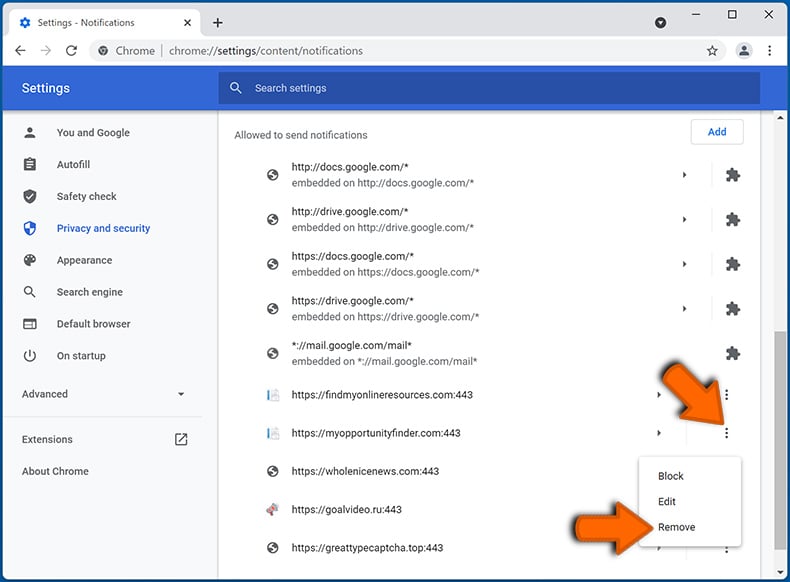
 Remove spam notifications from Google Chrome (Android):
Remove spam notifications from Google Chrome (Android):
Tap the Menu button (three dots) on the right upper corner of the screen and select "Settings". Scroll down, tap on "Site settings" and then "Notifications".
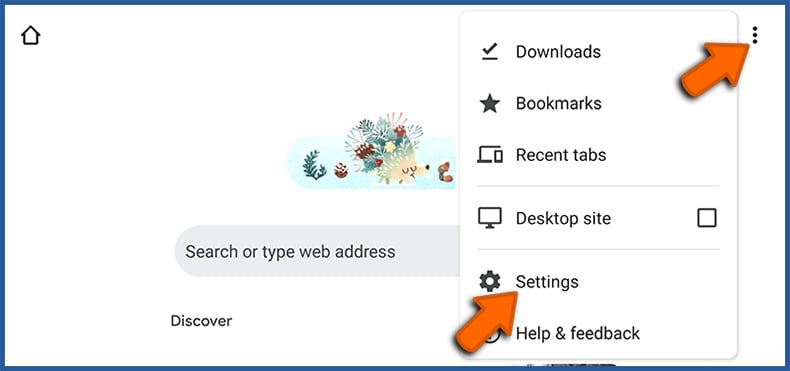
In the opened window, locate all suspicious URLs and tap on them one-by-one. Once the pop-up shows up, select either "Block" or "Remove" (if you tap "Remove" and visit the malicious site once more, it will ask to enable notifications again).
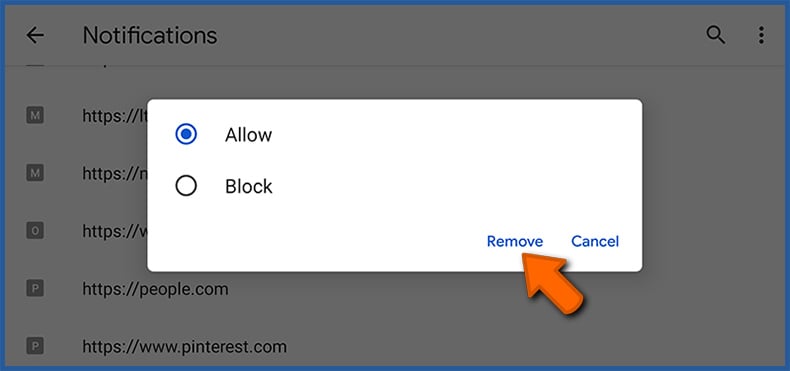
 Remove spam notifications from Mozilla Firefox:
Remove spam notifications from Mozilla Firefox:
Click the Menu button (three bars) on the right upper corner of the screen. Select "Settings" and click on "Privacy & Security" in the toolbar on the left hand side of the screen. Scroll down to the "Permissions" section and click the "Settings" button next to "Notifications".
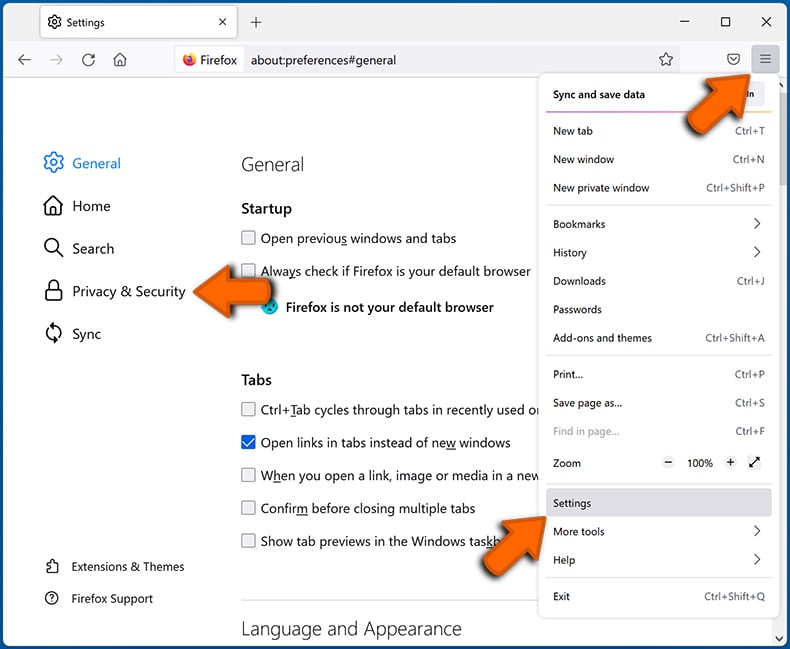
In the opened window, locate all suspicious URLs and block them using the drop-down menu or either remove them by clicking "Remove Website" at the bottom of the window (if you click "Remove Website" and visit the malicious site once more, it will ask to enable notifications again).
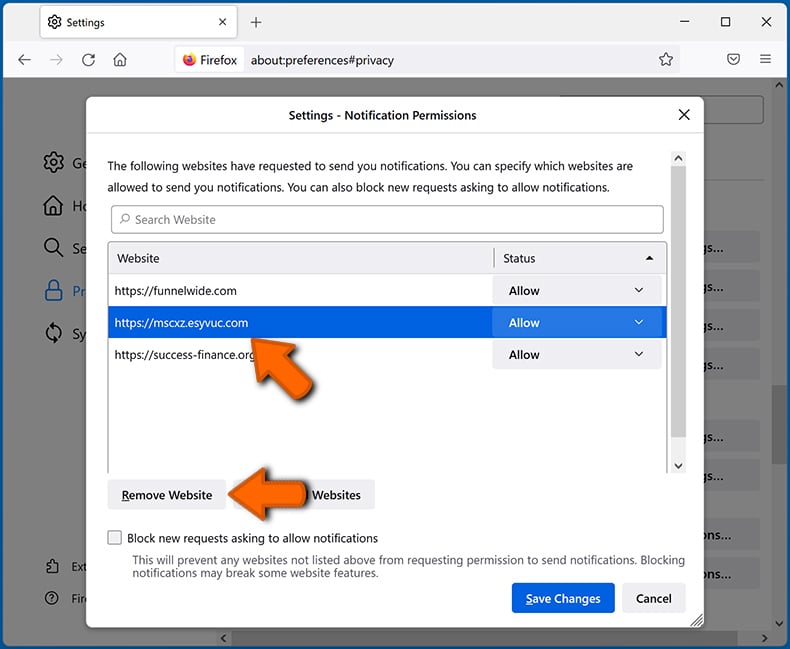
 Remove spam notifications from Microsoft Edge:
Remove spam notifications from Microsoft Edge:
Click the menu button (three dots) on the right upper corner of the Edge window and select "Settings". Click on "Cookies and site permissions" in the toolbar on the left hand side of the screen and select "Notifications".
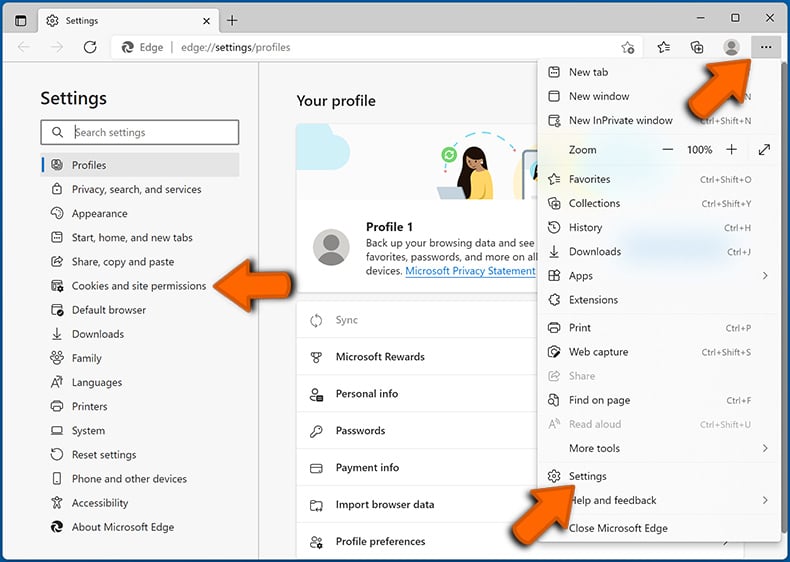
Click three dots on the right hand side of each suspicious URL under "Allow" section and click "Block" or "Remove" (if you click "Remove" and visit the malicious site once more, it will ask to enable notifications again).
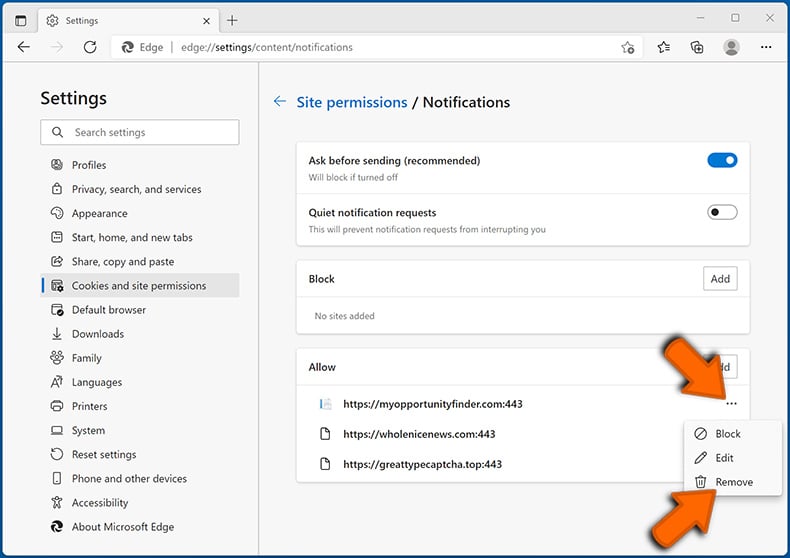
 Remove spam notifications from Safari (macOS):
Remove spam notifications from Safari (macOS):
Click "Safari" button on the left upper corner of the screen and select "Preferences...". Select the "Websites" tab and then select "Notifications" section on the left pane.
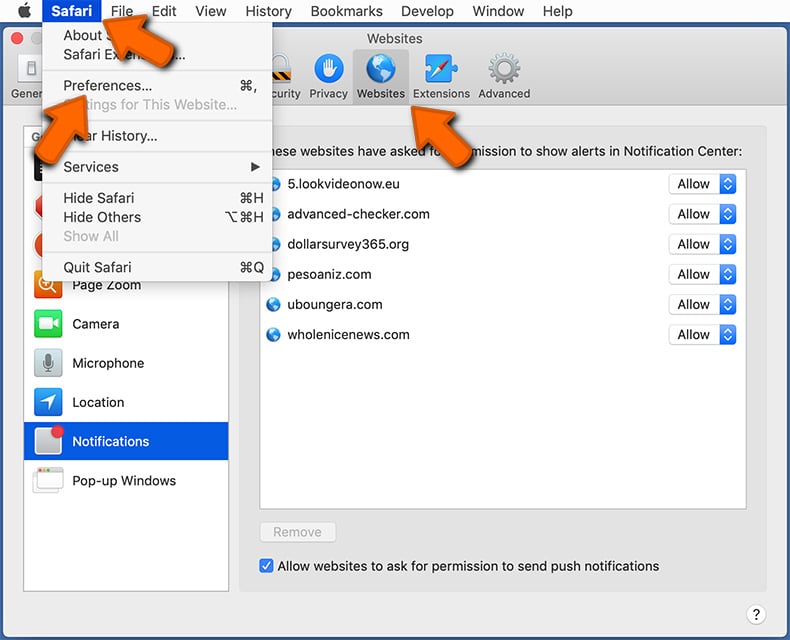
Check for suspicious URLs and apply the "Deny" option using the drop-down menu or either remove them by clicking "Remove" at the bottom of the window (if you click "Remove" and visit the malicious site once more, it will ask to enable notifications again)
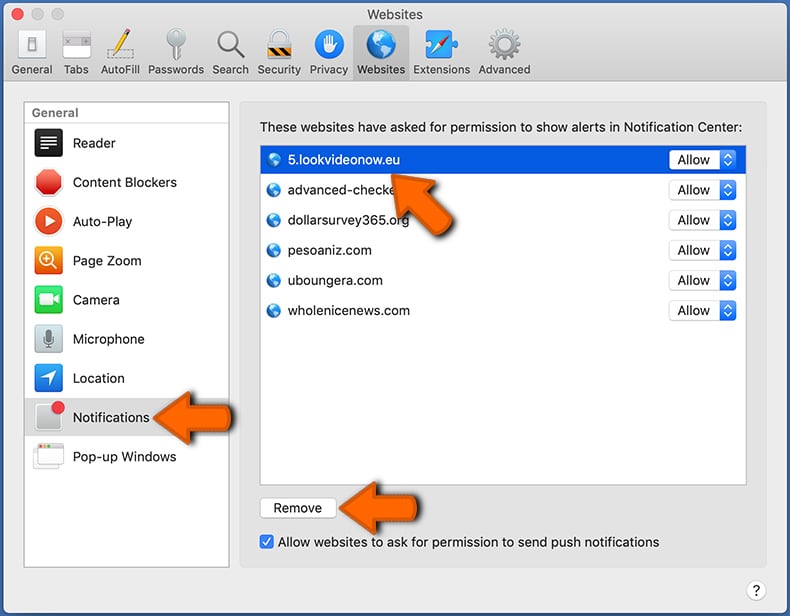
How to avoid browser notification spam?
Internet users should be very skeptical when being asked to allow notifications. While this is a useful feature that allows you to receive timely news from websites you like, deceptive marketers frequently abuse it.
Only allow notifications from websites that you fully trust. For added security - use an anti-malware application with a real-time web browsing monitor to block shady websites that tries to trick you into allowing spam notifications. We recommend using Combo Cleaner Antivirus for Windows.
Share:

Tomas Meskauskas
Expert security researcher, professional malware analyst
I am passionate about computer security and technology. I have an experience of over 10 years working in various companies related to computer technical issue solving and Internet security. I have been working as an author and editor for pcrisk.com since 2010. Follow me on Twitter and LinkedIn to stay informed about the latest online security threats.
PCrisk security portal is brought by a company RCS LT.
Joined forces of security researchers help educate computer users about the latest online security threats. More information about the company RCS LT.
Our malware removal guides are free. However, if you want to support us you can send us a donation.
DonatePCrisk security portal is brought by a company RCS LT.
Joined forces of security researchers help educate computer users about the latest online security threats. More information about the company RCS LT.
Our malware removal guides are free. However, if you want to support us you can send us a donation.
Donate
▼ Show Discussion